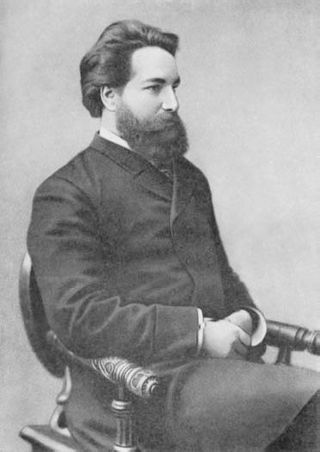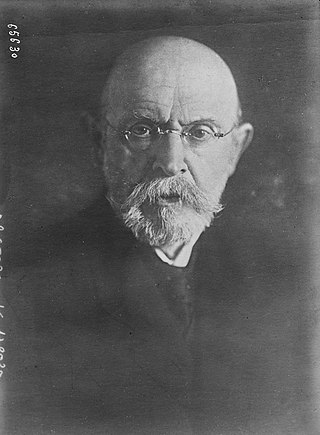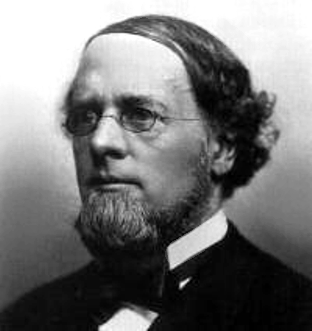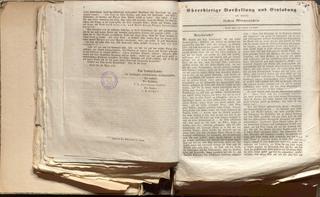
Nikolaus Alois Maria Vinzenz Negrelli, Ritter von Moldelbe was a Tyrolean civil engineer and railroad pioneer mostly active in parts of the Austrian Empire, Switzerland, Germany and Italy.

Johann Christian Reil was a German physician, physiologist, anatomist, and psychiatrist. He coined the term psychiatry – Psychiatrie in German – in 1808.

Baron Carl von Rokitansky was an Austrian physician, pathologist, humanist philosopher and liberal politician, founder of the Viennese School of Medicine of the 19th century. He was the founder of science-based diagnostics.

Sergei Sergeyevich Korsakov was a neuropsychiatrist from the Russian Empire, known for his studies on alcoholic psychosis. His name is lent to the eponymous Korsakov's syndrome and Wernicke–Korsakoff syndrome.

Alois Jirásek was a Czech writer, author of historical novels and plays. Jirásek was a high school history teacher in Litomyšl and later in Prague until his retirement in 1909. He wrote a series of historical novels imbued with faith in his nation and in progress toward freedom and justice. He was close to many important Czech personalities like Mikoláš Aleš, Josef Václav Sládek, Karel Václav Rais or Zdeněk Nejedlý. He attended an art club in Union Cafe with them. He worked as an editor in Zvon magazine and was nominated for the Nobel Prize in Literature in 1918, 1919, 1921 and 1930.

Wilhelm Griesinger was a German neurologist and psychiatrist born in Stuttgart.

František Vladislav Hek was a Czech writer, composer, and patriot active in the early phases of the Czech National Revival. He was a major inspiration behind the fictionalized novel F. L. Věk (1906) by Alois Jirásek.

Franz Joseph Andreas Nicolaus Unger was an Austrian botanist, paleontologist and plant physiologist.

Professor August Breisky was an Austrian gynecologist and obstetrician.

Paul Hörbiger was an Austrian theatre and film actor.

Rudolf Sutermeister was a Swiss medical doctor for the poor. He was also a businessman, a manufacturer, an early socialist and a socio-political writer. He is considered one of the first native Swiss German socialists, together with Gustav Siegfried, Johann Jakob Treichler, and Karl Bürkli; however, unlike Siegfried, he is also considered a utopian.
Hans Tietze was an Austrian art historian and member of the Vienna School of Art History.

The Church of Sts. Simon and Jude, situated next to the Brutalist Hotel InterContinental on U Milosrdných Street in the Old Town of Prague, dates back to 1354, when a hospital was founded on the site. The building was adjoined by a chapel that was sanctified by bishop Arnošt of Pardubice, a close friend of Emperor Charles IV.
Josef Johann Steinmann was an Austrian pharmacist and chemist.

Gottlob Friedrich Steinkopf was a German landscape painter in the Classical style.

Leopold Alois Hoffmann was an Austrian writer and dramatist. He was based for most of his career in Vienna.

Ludwig Julius Eisenberg was an Austrian writer and encyclopedist. He wrote a lexicon of stage artists, among other publications.

Karl Tersztyánszky von Nádas, officially Károly Tersztyánszky, also alternatively written Tersztyánszky de Nádas was an Austro-Hungarian general who served in World War I.

Wilhelm Wiesberg, real name Wilhelm Bergamenter, was an Austrian writer and folksinger.
Richard Batka was an Austrian musicologist, music critic and librettist. Educated at German Charles-Ferdinand University in his native city of Prague, he began his career as a lecturing academic at that institution in 1900; leaving that post in 1906 to teach on the faculty of the Prague Conservatory. In 1908 he moved to Vienna where he taught courses in the history of opera at the University of Music and Performing Arts Vienna from 1909 to 1914.

















